Classic Movie Review: Sight & Sound Number 1 Movie of All Time 'Jeanne Dielman'
The Sight & Sound list annoucement made me watch Jeanne Dielman with new perspective.
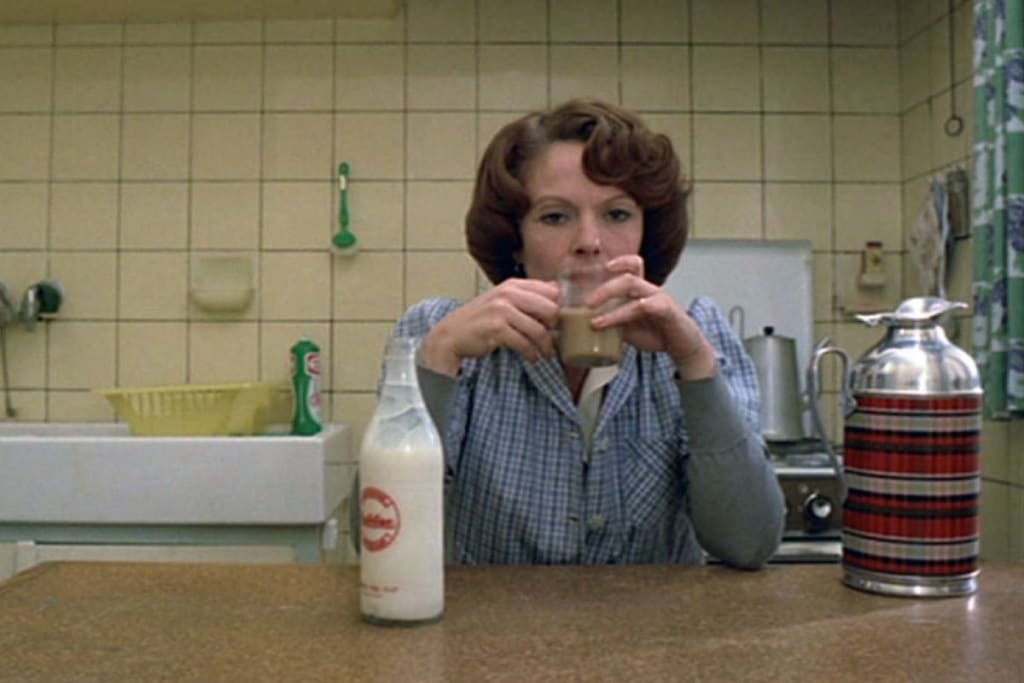
Jeanne Dielman 23 Commerce Quay 1080 Brussels (1975)
Directed by Chantal Akerman
Written by Chantal Akerman
Starring Delphine Seyrig, Jan Decorte, Jacques Doniol Valcroze
Release Date May 14th, 1975
Published December 4th, 2022
Jeanne Dielman stars Delphine Seyrig as the title character, a housewife, mother and sex worker named named Jean who lives in Brussels. Jeanne's life consists of a very specific routine. She has sex with anonymous men in the afternoon, for exactly the length of time it takes for potatoes to properly boil. The men pay her and leave and she cleans up in the shower before finishing the preparation of dinner just in time for her son, played by Jan Decorte, to arrive home. The following day we see more of the routine as Jeanne wakes before her son, makes breakfast and shuttles him off to school. She makes the beds, cleans up around the house and for maybe an hour, she watches the baby of her chatty neighbor.
Then Jeanne runs errands. She may stop for a cup of tea but then it is back home for her client, her shower, dinner and a clipped and brief conversation with her son. And on, and on, and on, the routine is laid out with some of the most mundane tasks of Jeanne's life, such as her shower routine or the peeling of potatoes, or the attempt to have one nice cup of coffee. These scenes play out in real time, of sorts and you are asked to either observe the mundane nature of these actions or let your mind wander into these scenes and find a story or a way to amuse yourself.
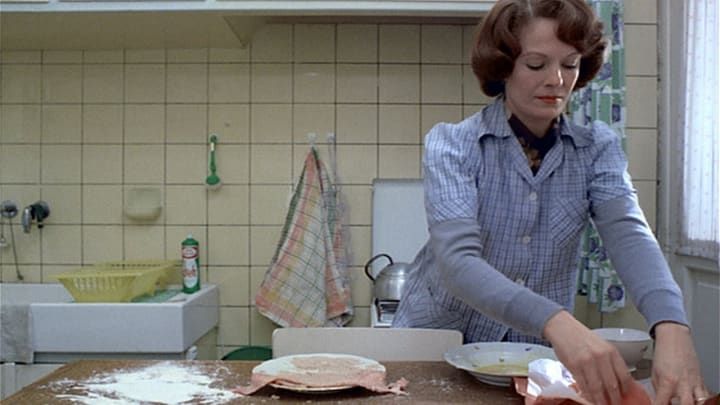
Through elegant visual filmmaking director Chantal Akerman tells us that the protagonist of Jeanne Dielman is a sex worker. We see her with an older man, they are familiar but not particularly intimate. He says he will see her next week as he hands her a handful of bills. There is no need for us to have seen them have sex or make the arrangements for the sex act, a hand full of bills and minor pleasantries, in the hands of a great filmmaker, can be all it takes to tell a story that introduces a character.
Then it is off to the bath. This isn't presented in a way that caters to the male gaze, Jeanne is seated in the tub, mostly obscured, this about the act of cleaning, not eroticism. This extends to a jump cut when it is time for Jeanne to get out of the bath. The jump cut from Jeanne seated in the bath, to Jeanne nearly finished dressing is visually important here. The jump cut prevents ogling or fantasizing. The way Jeanne cleans up after work is intended to show you how this is just an aspect of her job, the lack of specific nudity, the jump cut, are a visually dynamic reminder that this isn't intended as anything other than part of a work a routine.
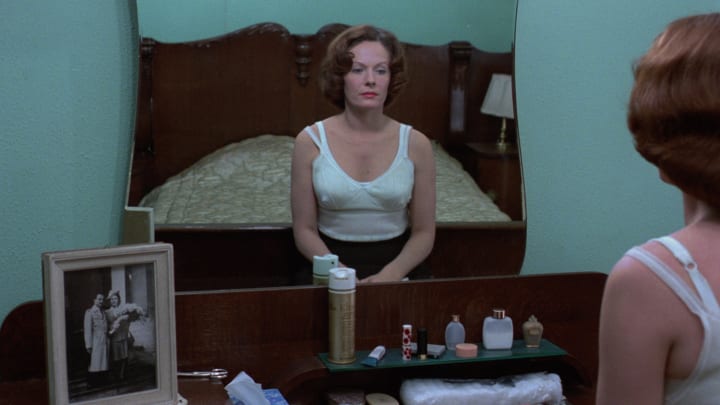
Jeanne's life is an example of the expectation of extreme patriarchy, the expectations placed on a woman in an extreme idea of patriarchy, one where a woman's life is dedicated to what men want or expect. The casual misogyny of this idea is portrayed in a conversation between Jeanne and her son, Sylvaiin (Jan Decorte). He says, "If I were a woman, I could only make love with someone if I were deeply in love." She replies, How could you know? You're not a woman." Sick burn. He doesn't appear to know that his mother is a sex worker, he's reacting to the rather matter of fact way she referred to her late husband, his father. He doesn't understand yet that men like him have dictated to women like his mother who their sexual partners should be, how a woman is intended to cater to the needs of men, regardless of their desires.
In a very basic reading of Jeanne Dielman, Jeanne is just a sex worker, a person who is compensated for having sex with someone, more often than not, a woman having sex with a male customer. But the way I read Jeanne Dielman, the fact of Jeanne's job is symbolic of the way women in the most extreme example of patriarchy are expected to cater their lives to men, husbands or otherwise. The three anonymous men who Jeanne has sex with in the movie could just as well be one man, a husband, because sex isn't about desire, it's about function. Providing sex for men is one of the functions of a woman in an extreme patriarchy. I'm adding that word, 'extreme' so that nitpickers can stop from getting caught up on the exact definition as a way of defending their awful idea of patriarchy.
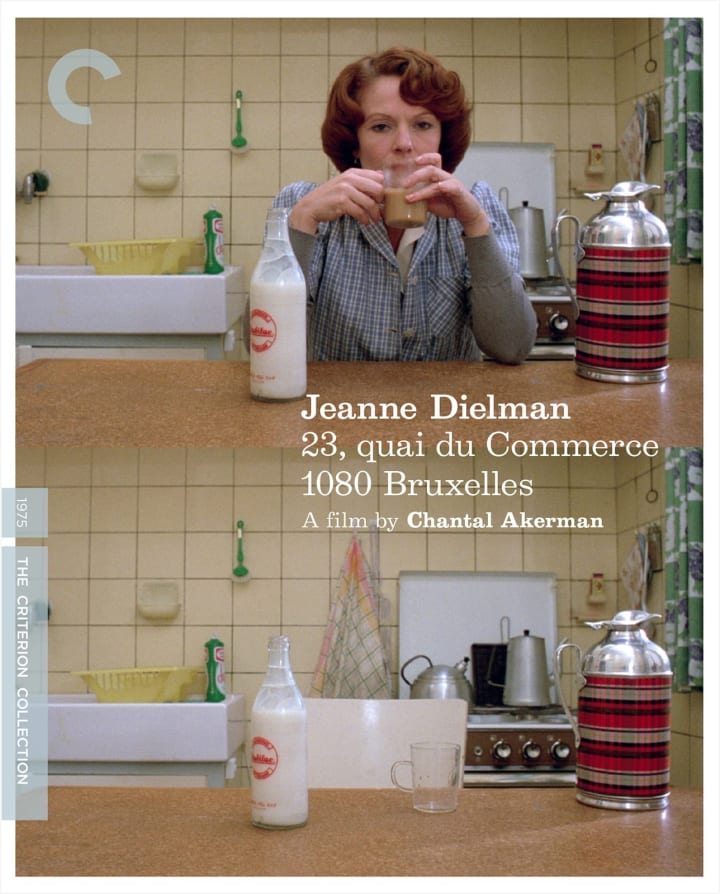
Sex, even in the life of a married woman, under an extreme patriarchal perspective, is merely a function of society. Sex is something that women are expected to provide in exchange for a man giving her a place to live, clothes on her back, and food on the table. Irony exists in how the woman is also expected keep the home, clean and prepare the clothes, and cook and prepare the food. All things we watch Jeanne do in the movie, in detail. Life in all aspects becomes mechanical as desires are replaced by the serving of expectations and that is a soul crushing idea that Jeanne Dielman displays brilliantly.
These men, Jeanne's clients or customers, are performing the function of a husband, providing financial support for Jeanne and her son, and they are serviced per the expectations of a woman in a patriarchal society. In just the same way that these men likely have wives at home who perform the same function in their lives only from a more practical than sexual manner, cleaning his home, making his dinner, and so on. Women in a purely patriarchal society have no life of their own, no desires, they serve at the pleasure and desire of men. Jeanne Dielman renders this notion brilliantly, punishingly, and at length.
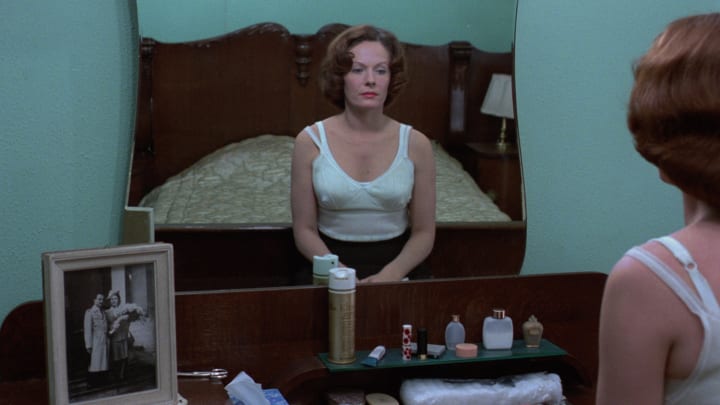
At 3 hours and 17 minutes long, Jeanne Dielman lingers on the daily routine of Jeanne Dielman, an average, everyday woman, a housewife whose everyday is somehow a service to a man. Whether that man is the baby she watches for a neighbor, her clients, or her ungrateful son. Having grown up in this society, Jeanne has been conditioned to create a daily routine that doesn't stray from her function in this patriarchal society, she has to provide a service to a man in some way. That's in the function of making breakfast and dinner, repairing shoes or replacing the buttons on a jacket for her son, or providing sexual release to daily strangers in her bed.
Akerman wants us to watch Jeanne proceed through her routine in lengthy and punishing detail as an example of what we are asking of a woman in extreme patriarchy. We demand their service in all aspects of making our lives easy while also asking that anything they want doesn't get in the way of what a man might need of her. Jeanne is dutiful to these tasks whether it is traveling to multiple locations to find a particular button for her son's jacket or making sure the potatoes she always serves with dinner are in abundance, apologizing even if the potatoes cause dinner to be slightly later than expected.
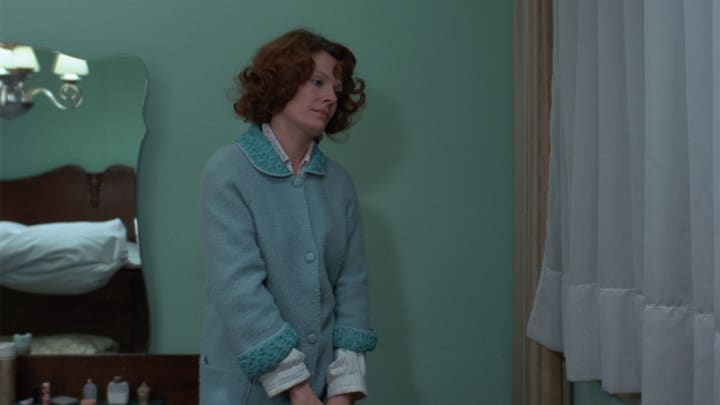
The result of a life lived to the patriarchal extreme is a life where a woman lives in punishingly boring servitude to men. For men, all things are possible in a life at work, of nights out with friends, of sex on demand. For a woman, her life consists of making the lives of men possible by being home, having meals prepared, clothing laid out, and being ready to lie back and think of England as a man gets what he needs to satisfy him. Akerman wants viewers to see for themselves the results of extreme patriarchal theory, the crushing, numbing boredom and heartache of being a woman in extreme patriarchy.
Let's talk about the ending of Jeanne Dielman, I guess I will call a spoiler alert here, but I don't feel this is a movie that could be spoiled, not really. In the final act of Jeanne Dielman, day three of our three day observation of Jeanne Dielman, Jeanne carries out her daily tasks leading up to the arrival of her client for that day. The previous two days, film language has been used to show these encounters happening without us actually seeing it. In one example, Akerman shows only a change of lighting in the hallway between Jeanne's bedroom and her front door. A static camera sits next to the front door, a man enters and Jeanne takes him to the bedroom. The passing of time is indicated by daylight giving way to darkness and then Jeanne and this man exit the bedroom, fully dressed, their business concluded.
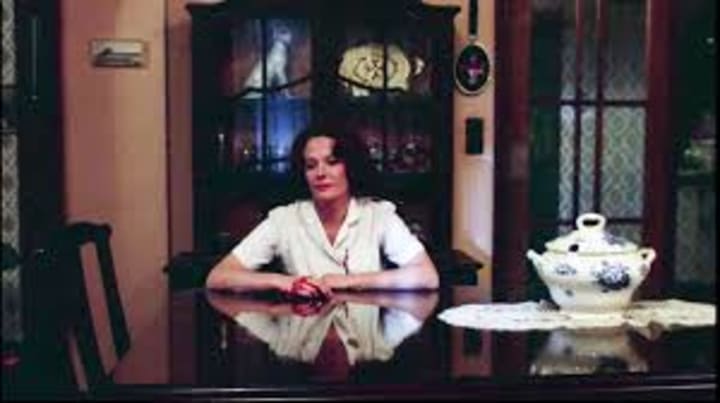
On this last of three days however, this final encounter, director Chantal Akerman wants us in the room. The sex act occurs and the man forcefully pushes and pushes until Jeanne has an unexpected orgasm. Jeanne is unnerved by this, she doesn't tend to have orgasms in these encounters. And in this case, this man seems particularly proud of himself. He has a stupid, smug look on his face and he's not following the rules about getting dressed and leaving in a timely fashion, one in keeping with Jeanne's routine. With only a passing look of frustration, Jeanne grabs a pair of scissors from her dressing counter and stabs the man in the throat.
As he bleeds out, Jeanne leaves the room, having fully dressed before killing the man, she moves to her dining room, blood staining her white blouse. She takes a seat and for several minutes the camera trains on the blank look on Jeanne's face. She stares at nothing and we can only stare at her, seeking some kind of emotional catharsis that will never arrive. How does Jeanne feel about what she has done? Why did she do it? That's up to you to decide.
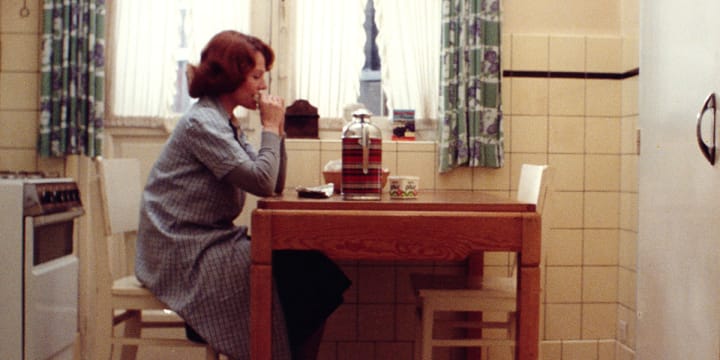
My reading of this ending is Jeanne finally deciding to escape from her routine. What more thorough way can one think of than symbolically murdering the patriarchy. It's a real murder, in the course of this being a movie, but it's more important as a symbolic ending to Jeanne's life of catering to the needs of men. Jeanne here is definitively taking agency, acting for herself for the very first time. It's a massive transgression but is it any worse than the transgression that is extreme patriarchy?
Why this guy? Why do this at this moment? It was the orgasm. The unwanted, undesired orgasm. Jeanne wasn't having sex for pleasure with this man. The orgasm was a function of physiology not desire. This combined with the smug way the man reacted to having caused the orgasm was likely infuriating. He acted as if he'd done a good thing. He acted as if he'd accomplished something and he was deserving of praise. I kind of wanted to stab him too.
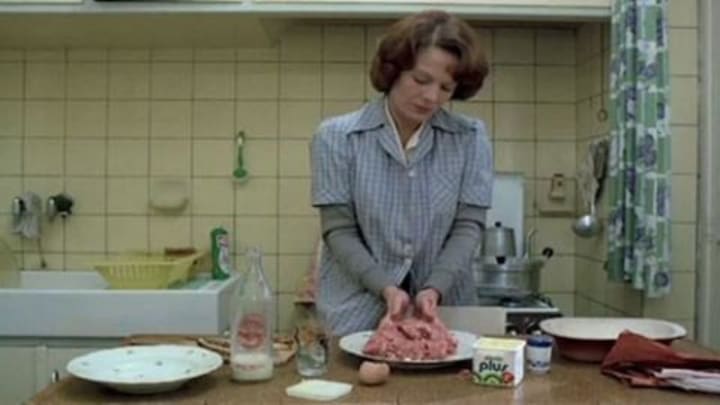
I'm sure some of you are confused by this reading so allow me to elaborate. Sex between two consenting, loving partners is about mutual pleasure, it's an act of trust and cooperation. It's two people sharing a moment of pure, human connection. A person is capable of an orgasm at any moment with the right physical stimulation. But an orgasm is more than that on a symbolic level, in this case, it's an unwanted result. Jeanne is not here for pleasure, she's working. He forced this upon her. Giving someone an orgasm should be the result of a mutual desire for pleasure, not something that a person inflicts upon another. Causing an orgasm is nothing to brag about, it's an outcome, not an accomplishment.
This man didn't give Jeanne an orgasm, he was there, and he provided physical stimulation that she was unable to stop him from providing, though she appears to try. Thus, for him to have that smug smile and act with some sense of accomplishment, considering the circumstances, this is her her job not a real instance of desire, it's infuriating. Jeanne has reached a point with the smug entitlement of the men she's dealt with her whole life, those who pushed her life to be one of remarkably dull routine, that she finally cannot take it anymore and she enacts violence.
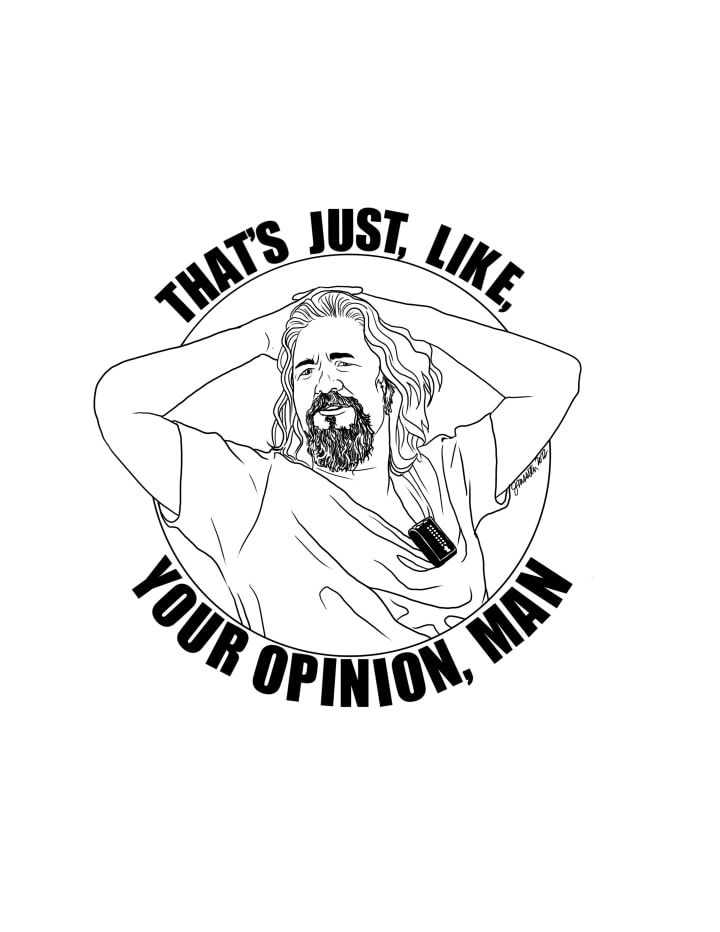
That's my reading of the scene. You will have your own and that's the point. In the end, Chantal Akerman is inviting you to decide how you feel about Jeanne Dielman. The movie reveals you and how you see the world. It invites you into the daily life of Jeanne Dielman to wander around in the margins and make decisions about Jeanne and who she is and what she does, why she does it. It's an incredible act of cinema, an intellectually interactive experience.
Find my archive of more than 20 years and nearly 2000 movie reviews at SeanattheMovies.blogspot.com. Find my modern archive of reviews on my Vocal Profile, linked here. Follow me on Twitter at PodcastSean. Follow the archive blog on Twitter at SeanattheMovies. Listen to me talk about movies on the Everyone's a Critic Movie Review Podcast on your favorite podcast app. If you have enjoyed what you have read consider subscribing to my writing on Vocal. If you would like to support my writing you can do so by making a monthly pledge or by leaving a one-time tip. Thanks!
About the Creator
Sean Patrick
Hello, my name is Sean Patrick He/Him, and I am a film critic and podcast host for the I Hate Critics Movie Review Podcast I am a voting member of the Critics Choice Association, the group behind the annual Critics Choice Awards.






Comments
There are no comments for this story
Be the first to respond and start the conversation.